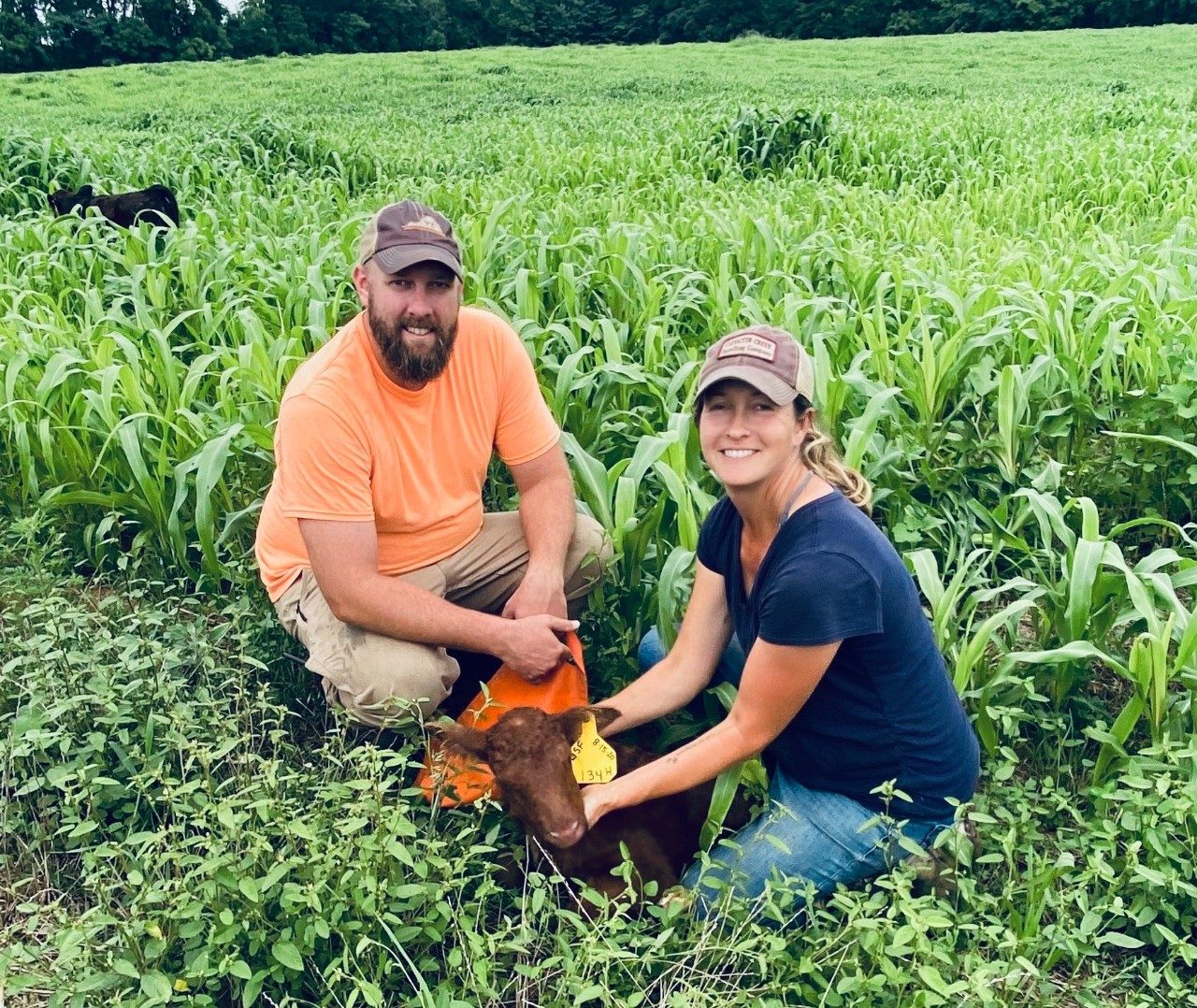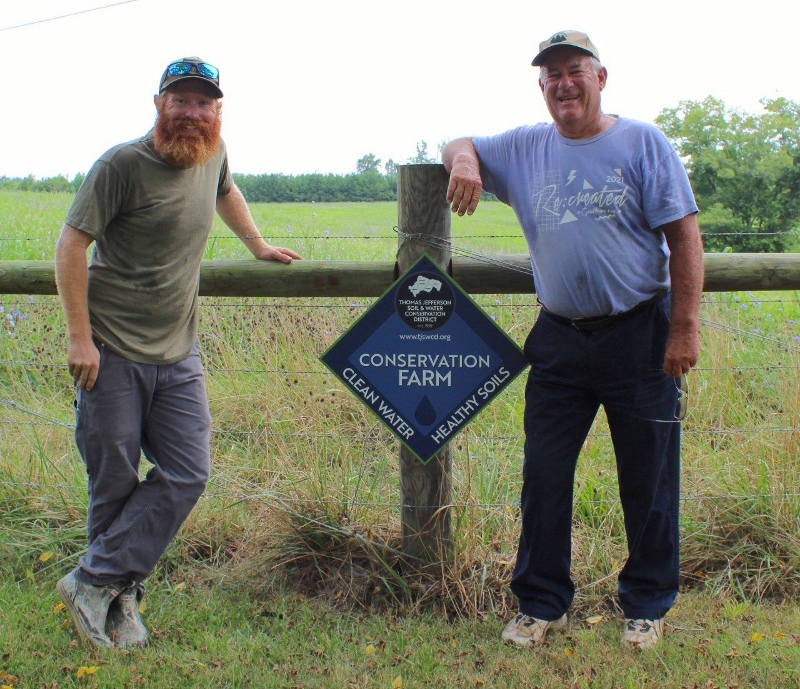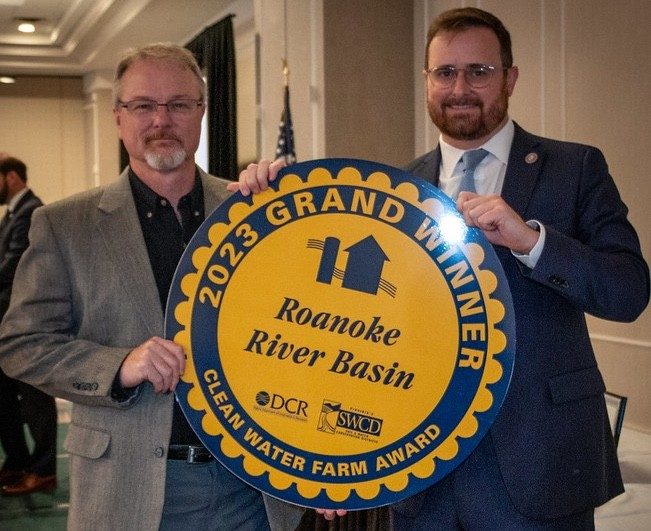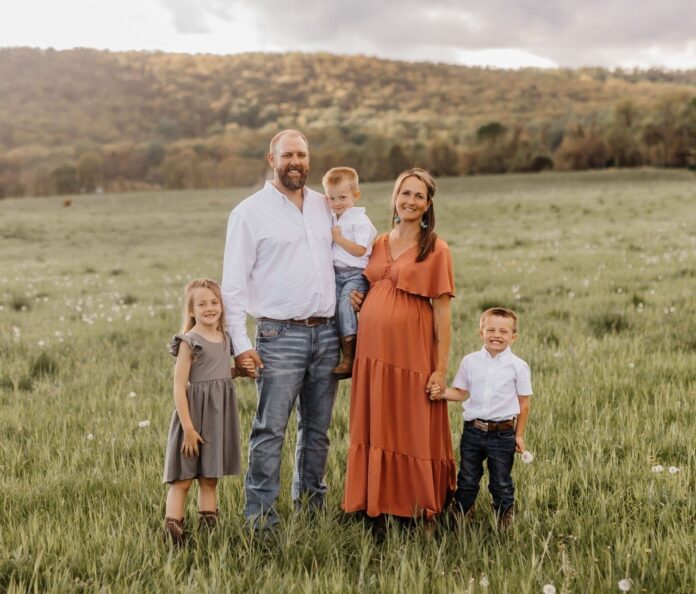What do a sustainable grass-based livestock farm in Loudoun County, a fifth-generation former tobacco farm in Pittsylvania County, and a fourth-generation cattle farm in Louisa County have in common?
They are all Hokie-owned and operated family farms that are doing their part to preserve Virginia’s waterways and natural resources.
Three Virginia Tech alumni families recently earned Virginia Clean Water Farm Awards from the Virginia Department of Conservation and Recreation. The awards recognize up to 10 farmers from among the commonwealth’s 47 soil and water districts whose conservation practices and dedication to protecting natural resources make them role models for producers across Virginia.
Though their backgrounds and approaches are different, these families demonstrate a commitment to soil, water, and land conservation on their farms.

Justin ’08 and Casey ’09 Wisch
Justin and Casey Wisch own Long Stone Farm, a 250-acre farm specializing in pasture-raised beef, pork, lamb, chicken, and eggs. They sell their products to regional restaurants and stores and also operate two farm stores, offer farm and culinary tours, and produce small-batch cider and wine from their orchard.
The Wisch family focuses on producing high-quality meat and eggs in managed grazing systems that are beneficial to livestock and surrounding ecosystems. Everything produced on the farm is free of antibiotics, hormones, pesticides, insecticides, and herbicides.
“Conservation and farming can go hand-in-hand,” said Casey, who earned a bachelor’s degree from the Pamplin College of Business. “Our mission is to produce high-quality, clean meat for local consumers that has a positive environmental impact. We have experienced a huge customer response to our farm over the last 10 years.”
Since 2014, the Wisch family has partnered with the Loudoun Soil and Water Conservation District and the Natural Resources Conservation Service on various projects including installing fences and natural buffers to protect streams from livestock, using water pads and corrals, and converting cropland to perennial pasture.
The family also works with an oyster producer on Tangier Island to support the production and sale of fresh bay oysters through a partnership formed Chesapeake Bay Foundation’s Farmers to the Bay initiative.
“It’s exciting to be recognized by the state for our commitment to conservation,” Casey said.

Fred Massie ’78 and Peter Massie
Fred Massie, a graduate of the College of Agriculture and Life Sciences and College of Engineering, and his son, Peter, were recognized for conservation measures on their fourth-generation family farm in Louisa County.
The father-son duo grazes cattle on 450 acres across multiple farms in the York River Basin. They have steadily transitioned from an open pasture system to rotational grazing techniques, which move cattle from field to field and are better for soil and wildlife health. Since 2018, they have worked with the Thomas Jefferson Soil and Water Conservation District to install infrastructure protecting 33,000 feet of stream bank and created 75 acres of natural vegetation buffers to protect streams and important wildlife corridors.
“Working with conservation organizations has allowed us to utilize fields much better for grazing,” Fred Massie said. “Doing more rotational grazing has freed up time and labor to be able to do other things.”
Fred Massie earned his agricultural engineering degree from Virginia Tech and completed a cooperative education with International Harvester in Chicago before becoming the primary farm operator in 1984. His son, Peter, joined him after returning home from service with the U.S. Marine Corps in 2014.
“These conservation practices will allow us to keep farming for many more decades and encourage others to save the soil for generations to come,” Fred Massie said.

Tim ’87, Amy, Justin, Samuel, Faith, and Zachary ’25 Alderson
Tim Alderson and his family strive to implement conservation practices on their 210-acre farm by improving surrounding water quality and sharing information with other producers in the area.
Alderson, an alumnus of the College of Agriculture and Life Sciences and College of Engineering, helps preserve the health of his land by using rotational grazing to feed his 75 cow/calf pairs and three bulls. He keeps cattle away from streams and ponds by using 28 acres of natural buffer zones, 12,000 feet of fencing, and alternative watering facilities that include troughs, wells, and 11,000 feet of pipelines. He routinely takes plant and tissue samples to ensure soil health for the best quality forage to feed his cattle.
Alderson commended the Pittsylvania Soil and Water Conservation District for its efforts to partner with farmers to improve their land and protect natural resources.
“The award is an honor because I know the Roanoke River Basin covers a big area,” Alderson said. “I’ve gotten a lot of pleasure out of improving the land. It used to be a tobacco farm and was highly eroded. It’s been very rewarding to ride through the land now and see how nice it looks.”
By Marya Barlow

